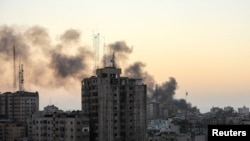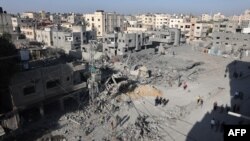- Biden, Netanyahu discuss by phone the next steps in the Israeli operation and humanitarian pauses in Gaza.
- Netanyahu says he expects Israel will have security responsibility in Gaza for indefinite period.
- The Hamas-run health ministry in Gaza said the death toll from Israeli attacks has surpassed 10,000.
- U.N. agencies and international charities have issued a rare joint statement calling for an immediate humanitarian cease-fire in Gaza.
Prime Minister Benjamin Netanyahu said Israel would consider short-term pauses in military operations to allow for humanitarian goods to reach the Gaza Strip or for hostages held by Hamas militants to leave, but he ruled out a general cease-fire in Israel’s month-old war with Hamas.
Speaking to ABC News, Netanyahu said he envisions Israel will “have the overall security responsibility” in Gaza for an indefinite period after achieving its goal of routing Hamas.
"When we don't have that security responsibility, what we have is the eruption of Hamas terror on a scale that we couldn't imagine,” Netanyahu said.
The White House said Monday that President Joe Biden and Netanyahu discussed in a phone call the possibility for tactical pauses to allow civilians in Gaza to safely depart from areas of ongoing fighting, to ensure assistance is reaching civilians in need, and how to enable potential hostage releases.
Biden reiterated his steadfast support for Israel in its fight against Hamas while also emphasizing the imperative to protect Palestinian civilians and reduce civilian harm during military operations. He also addressed the situation in the West Bank and the need to hold extremist settlers accountable for violent acts.
The U.N. humanitarian office said 93 trucks carrying food, medicine, health supplies and water had crossed from Egypt into Gaza on Monday. It said since deliveries began on Oct. 21, a total of 593 trucks entered Gaza, compared to an average of 500 a day that were entering before the war began.
The Israel-Hamas conflict was on the agenda as foreign ministers from the Group of Seven leading industrial nations began two days of talks in Japan.
U.S. Secretary of State Antony Blinken said he would brief his counterparts about his four-day tour of the Middle East that included stops in Israel, the West Bank, Jordan, Cyprus, Iraq and Turkey.
Speaking to Japanese Foreign Minister Yoko Kamikawa, Blinken said Tuesday it is a “very important moment for the G7 to come together in the face of this crisis and speak, as we do, with one clear voice.”
At a virtual briefing Monday, White House National Security Council spokesperson John Kirby expressed hope that humanitarian pauses will be implemented as soon as possible in Gaza.
He said the United States will continue this conversation with the Israelis for as long as it takes and said there are some indications that efforts are being made to minimize collateral damage in Gaza. But he cautioned, “I don’t want to overstate that.”
Kirby said many thousands of innocent people have been killed, adding “each one's a tragedy” and “we don’t want to see any innocent lives taken.”
He said the U.S. is doing everything it can to urge Israeli leaders to be as cautious as possible in military operations. But he reminded that Israel also is up against an enemy hiding behind civilians.
The Hamas-run health ministry in Gaza said the death toll from Israeli attacks has surpassed 10,000.
Israel has denied deliberately targeting innocent Palestinians in Gaza, saying Hamas uses civilians as human shields, dug tunnels under hospitals and was transporting its fighters in ambulances.
Jordan, meanwhile, said Monday it was leaving "all options" open on how to respond to what it called Israel’s failure to discriminate between military and civilian targets in its intensifying bombardment and invasion of the Gaza Strip.
Prime Minister Bisher al Khasawneh did not elaborate on what steps Jordan would take. Jordan has recalled its ambassador from Israel to protest Israel’s offensive in Gaza.
"All options are on the table for Jordan in our dealing with the Israeli aggression on Gaza and its repercussions," Khasawneh, whose country signed a peace treaty with Israel in 1994, told state media.
U.N. agencies and international charities issued a rare joint statement Monday calling for an immediate humanitarian cease-fire.
“For almost a month, the world has been watching the unfolding situation in Israel and the occupied Palestinian territory in shock and horror at the spiraling numbers of lives lost and torn apart,” the joint statement said.
“Tens of thousands of people have been displaced,” the statement said. “This is horrific."
The groups, including the WHO, UNICEF, the World Food Program, CARE International, Save the Children and Mercy Corps, noted that 1,400 people were killed and more than 200 taken hostage in Israel in Hamas’ Oct. 7 attack.
“The horrific killings of even more civilians in Gaza is an outrage,” the agencies said, “as is cutting off 2.2 million Palestinians from food, water, medicine, electricity and fuel.”
Some information for this article was provided by The Associated Press, Reuters and Agence France-Presse.







